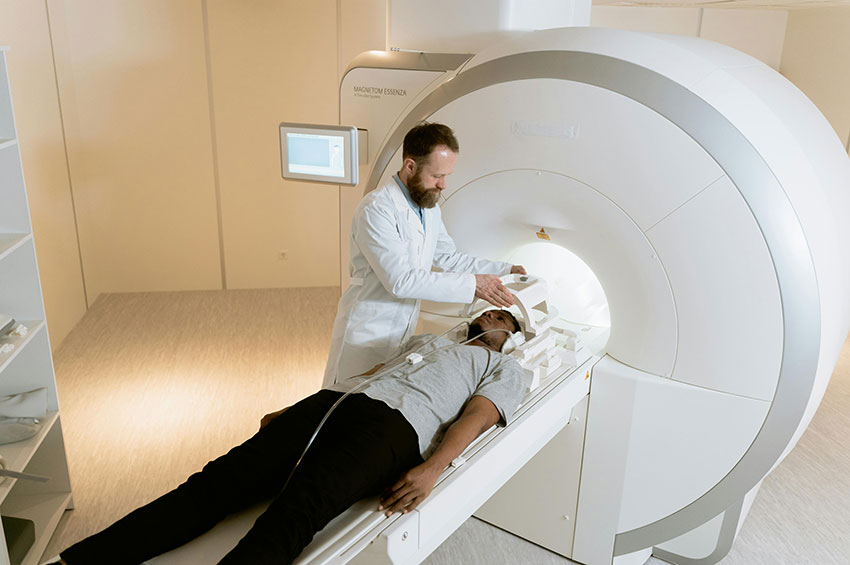
- March 11, 2025
- Attorney David Mann
- Personal Injury
Imagine this scenario: While running errands on a weekend, your car was hit in the rear by another vehicle. You find out that the other driver was distracted by his cell phone and didn’t see your car stopped at a red light. The other driver was going fast and your injuries are extensive. Your doctor relays that you have suffered a brain injury due to the accident. As a result, you will miss a substantial amount of time at work and will need extensive rehabilitation therapy.
Brain injuries can range from mild to severe and sometimes symptoms don’t start to show until days or weeks after an accident. Also, brain injuries can be very complex and can be difficult to prove when filing a personal injury claim. That is why medical evidence is extremely important when you are seeking compensation for a brain injury in Georgia.
The purpose of this blog post is to discuss the important role of medical evidence when proving a brain injury claim in Georgia.
Why Medical Evidence is Crucial
- Establishing the injury – As with all personal injury claims, you need to establish that you have an injury. This can be accomplished by obtaining your health records from the date of the accident. Specific records for brain injuries are MRIs and other scans.
- Linking the injury to the incident – You must prove that your brain injuries were caused by the accident. Your physician and expert witnesses can provide your attorney with this important information
- Documenting the impact – The impact of brain injuries on an injured person’s life can be devastating. Affidavits from physical therapists and psychologists will help establish the overall impact of a brain injury on an accident victim.
- Calculating damages – Your compensation is directly associated with the severity of your injuries. Your lawyer can use calculations of medical bills, lost wages, and pain and suffering to calculate your damages.
Types of Medical Evidence
There are different types of medical evidence that can be used in order to prove the severity of your injuries. You should gather as much medical evidence as possible to prove your injuries. Types of useful medical evidence for you brain injury claim include:
- Medical Records – The more detailed your medical records, the more precise your compensation could be. Detailed records, including hospital records, reports from therapists, and brain scans, will show the extent of your injuries your attorney can use in settlement negotiations with the insurance company. The more detailed, the better.
- Neuropsychological evaluations – Comprehensive neuropsychological evaluations will show the severity of cognitive impairments, including memory, language, attention, and executive functions. Experts in neuropsychology can provide testimony at trial or during settlement negotiations, detailing the level of impairment.
- Expert medical testimony – Experts in their fields can provide testimony on the cause and severity of your brain injury. Expert witness testimony from neurologists, psychiatrists, and neuropsychologists can increase your chances of compensation because they come from top professionals in their field.
Gathering and Preserving Medical Evidence
It is important to gather and preserve all evidence after a brain injury caused by an accident. Your brain injury lawyer will use all of it to negotiate compensation amounts with the insurance company.
- Seek immediate medical attention – You should see a doctor as soon as possible after a brain injury. Your recovery should be your No. 1 priority. Also, you can hire a lawyer right away and they can get started on your claim.
- Follow medical advice – You should always follow the advice of medical professionals and never miss appointments. Insurance companies can hire private investigators to follow you, and they will report any odd behavior.
- Keep detailed records – You should be organized and keep a detailed record of any invoices and payments you have made. Also, we always recommend keeping a daily journal of your pain and suffering.
- Request copies of all medical records – You should obtain all copies of medical records from primary doctors and specialists. Give copies to your lawyer and keep a set for yourself. You can request copies directly from your provider, and sometimes they have portals where you can download any records.
- Consult with a brain injury lawyer – A brain injury lawyer has the knowledge and experience with these complex cases and will fight for your rights against insurance companies.
How a Brain Injury Lawyer Can Help
You might think you don’t need a brain injury lawyer to help you with your claim. Insurance companies hire top lawyers to help deny claims and you should have an experienced lawyer on your side as well. A brain injury lawyer can help by:
- Reviewing and analyzing your medical records – Your lawyer will be able to provide an estimate of compensation amounts by looking at all your medical records.
- Speaking with medical experts – Your lawyer will know what types of medical professionals to speak with who can provide expert testimony on your behalf.
- Negotiate with the insurance companies – Nobody wants to deal with insurance companies, especially if they have severe brain injuries. Your lawyer will negotiate with the insurance company in settlement talks.
- File a personal injury lawsuit – Your lawyer will file a lawsuit in court if the insurance company is not willing to provide a worthwhile settlement in good faith.
We hope this blog post helped you understand the important role of medical evidence when proving a brain injury claim in Georgia.
Call the Mann Law Firm Today to Discuss Your Claim With a Brain Injury Lawyer
The brain injury lawyers at the Mann Law Firm understand the pain and suffering you are going through after a brain injury. We have helped numerous clients with their personal injury cases, including complex brain injury claims. We fight for you against the insurance companies. In fact, David Mann used to work as in-house defense counsel at a large insurance firm, so he knows the tactics used to deny claims. Call us today at (478) 742-3381. We work on a contingency basis, which means we don’t get paid unless you collect compensation.



 Before leading his own firm, Mann served for several years as in-house defense counsel for a large insurance company, which gives him unique insight into how insurance companies work. He uses this critical knowledge as an advantage for his clients. He is a tough negotiator and litigator, and he is exceptionally strategic in building cases on behalf of personal injury victims.[
Before leading his own firm, Mann served for several years as in-house defense counsel for a large insurance company, which gives him unique insight into how insurance companies work. He uses this critical knowledge as an advantage for his clients. He is a tough negotiator and litigator, and he is exceptionally strategic in building cases on behalf of personal injury victims.[ 
